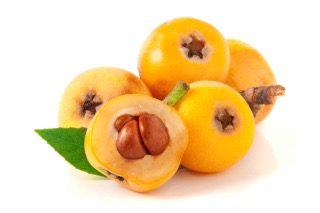

While dogs can eat loquats, it’s important to exercise caution due to the toxic nature of the fruit’s seeds. Cyanogenic glycosides found in the seeds can produce cyanide when broken down, making it crucial to serve completely deseeded loquats to dogs in moderation.
Loquats are a great source of vitamin A, vitamin B6, and folate, boasting antioxidant and anti-inflammatory properties that can boost a dog’s immune system. Additionally, they contain essential minerals such as potassium, manganese, and magnesium, which support healthy organ function. Loquats are also rich in fiber, promoting healthy digestion.
While the flesh of the loquat fruit is safe for dogs to consume, the seeds contain natural plant toxins that can be highly toxic when consumed in large quantities or chewed up. The seeds also pose a choking hazard and can cause intestinal blockages.
Always remove the seeds before serving loquats to dogs, providing only the flesh of the fruit. It’s best to serve loquats as an occasional treat and in moderation.
Loquats, also known as Japanese plums or Chinese plums, are a sweet fruit that originated in China and are now commonly grown in Asia and Mediterranean regions. Although dogs can eat loquats, it's important to be cautious as the seeds contain natural plant toxins that can be toxic in large quantities. However, loquats are rich in vitamins, minerals, and fiber, providing a great boost for a dog's immune system and digestion. If you decide to serve loquats to your furry friend, always remove the seeds and give them only a small amount as an occasional treat.
While loquats can be beneficial for dogs in moderation, it's important to remember the risks associated with the seeds. The seeds are not only toxic but can also pose a choking hazard and cause intestinal blockages if ingested. Therefore, it's crucial to remove all seeds before giving loquats to your pet.
Loquats are generally easy to access and affordable in areas where they are commonly grown. When serving loquats to your furry friend, consider making them into a frozen treat by pureeing the flesh and freezing it in small servings.
If you're hesitant about serving your dog loquats, there are alternatives that offer similar nutritional benefits, such as blueberries and bananas.
Have you ever given your pet loquats? How did they respond to the fruit? Remember to always prioritize your pet's health and speak with your veterinarian before introducing any new foods to their diet.
Keep your furry friend happy and healthy!